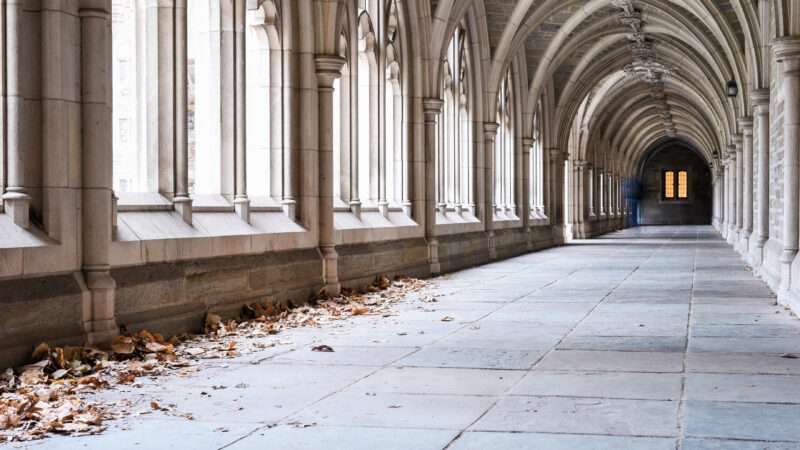
Last December, Princeton University was slated to host an exhibition of 19th-century Jewish American artwork provided by Leonard Milberg, a Princeton alum and patron of the arts. Milberg pulled out, however, due to disagreements with the university.
In statements to The Daily Princetonian, a university spokesperson made it sound like Milberg was ultimately responsible for the exhibition not taking place. But both Milberg and the curator, art historian Samantha Baskind of Cleveland State University, tell a very different story: Princeton officials had objected to the inclusion of artwork by two 19th-century Jewish Americans who had served as soldiers in the Confederate army during the Civil War.
"Princeton forced the cancelation by canceling the two most important artists," Baskind tells Reason. "It would be impossible to have an accurate show about nineteenth-century Jewish American art without its most outstanding figure: Moses Jacob Ezekiel."
Indeed, a well-known piece by Ezekiel was intended to serve as the centerpiece. That work is "Faith," a 64-inch marble statue completed by Ezekiel in 1876. It was commissioned by a Jewish fraternal organization to commemorate the 100th anniversary of the signing of the Declaration of Independence; a replica currently stands outside Philadelphia's National Museum of American Jewish History.
Ezekiel is a complicated historical figure who fought for the Confederacy and supported the Lost Cause, the idea that the Civil War was about the southern states defending themselves from northern aggression. A second artist whose work would have been part of the exhibition, Theodore Moise, also served in the Confederate Army. But of course, history is filled with flawed people who nevertheless made important contributions to literature, art, science, and philosophy. Besides, the works in question had nothing to do with the Confederacy, and would have been displayed alongside labels that contextualized the artists and acknowledged their unsavory ties.
"History doesn't come with neat, sanitized figures," says Baskind. "Princeton canceled exactly the type of a show that a university should tackle."
Problems arose last October, during the planning stages of the exhibition. That's when the university's vice provost for institutional equity and diversity became involved, according to Religion News Service. The administrator wanted Ezekiel and Moise dropped.
Milberg, who has previously contributed more than 13,000 pieces to Princeton's collections, balked at the idea of modifying the showcase in order to satisfy administrators' sensitivities.
"Once you start canceling things, it never ends," he told The Daily Princetonian.
Baskind describes Princeton's behavior as "an unfortunate anti-intellectual surrender to cancel culture." She commends Milberg for refusing to sponsor historical revisionism.
"He took a very principled stand by choosing not to fund the exhibition after the library took curatorial matters in their own hands," she says. "He disagreed with Princeton's decision to censor the show and erase history."
Jonathan Sarna, a professor of Jewish American History at Brandeis University whose work had informed the exhibition, also objected to Princeton's capitulation. The fact that two of the most important Jewish American artists of the 19th century were Confederate soldiers is something that merits conversation, not censorship, says Sarna.
"One approach is that we have faith in the audience; we display in full complexity the material and talk about it," Sarna told Religion News. "The other approach is that we cancel it. I'm very reluctant to be part of the woke, [part of] cancel[ing] everything that doesn't conform to present-day moral standards."
An institution of higher education might have expressed curiosity about the intersection of these subjects—the Jewish American experience, the Civil War, and 19th-century art—and invited its students to contemplate them. Princeton's impulse was exactly the opposite: to bury the truth.
Of course, the issue here isn't really the Princeton as a whole, but rather the fact that the relevant decision maker is a risk-averse diversity coordinator. As long as the office of institutional equity holds sway, liberal values like freedom of expression and diversity of thought will be threatened on campuses.
Michael Hotchkiss, a spokesperson for Princeton, denied that the university had cancelled the exhibition.*
"Neither the Library nor the University caused this exhibit to be cancelled," said Hotckiss in a statement to Reason. "It was cancelled by the donor, after the University insisted on its principles prohibiting donors from interfering with the academic freedom of librarians to determine how material in exhibitions will be contextualized and displayed."
That's not how Baskind sees it.
"Princeton's effort to avoid any potential controversy was at the expense of a tremendous opportunity to show intriguing and exceptional art to their students, and to open up crucial conversations," says Baskind. "A vital learning moment was lost."
Update: Princeton has provided a statement about the exhibition.
The post Art Curator Accuses Princeton University of 'Anti-Intellectual Surrender to Cancel Culture' appeared first on Reason.com.







